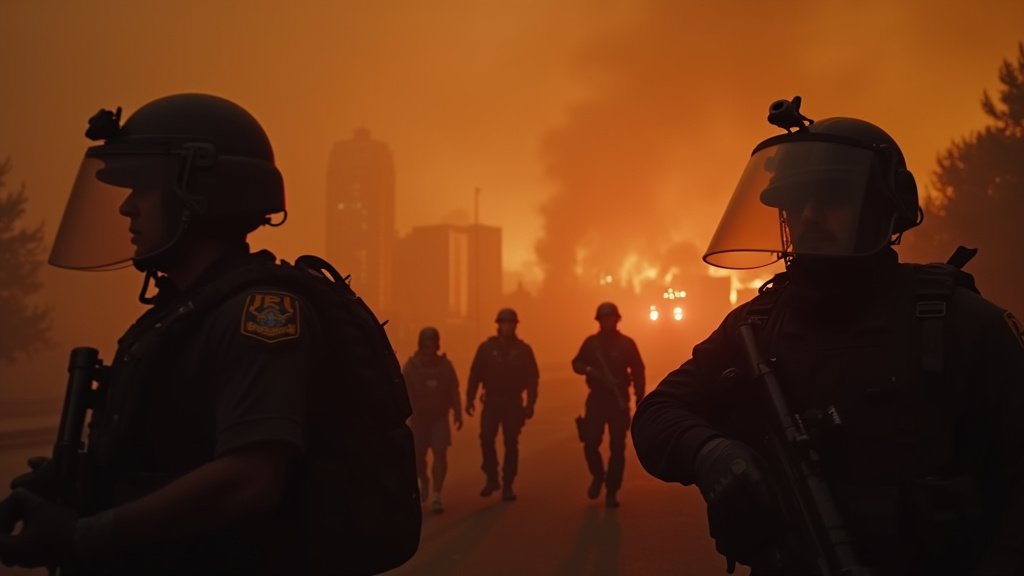Washington D.C. – September 28, 2025 – In a day marked by significant political and legal developments, President Donald Trump announced Saturday his intention to deploy federal troops to Portland, Oregon, authorizing “Full Force, if necessary,” to combat what he described as “domestic terrorists.” The move comes concurrently with the indictment of former FBI Director James Comey on charges of making false statements to Congress and obstruction of a congressional proceeding.
Federal Troops Deployed to Portland
President Trump declared his intention via social media on Saturday, directing the Department of Defense to “provide all necessary Troops to protect War ravaged Portland” and its U.S. Immigration and Customs Enforcement (ICE) facilities, which he alleged are “under siege.” This escalation of federal intervention in American cities is framed by the administration as a response to escalating political violence, particularly following the assassination of conservative activist Charlie Kirk earlier this month. Portland, Oregon, has been a focal point for protests since 2020, and this decision signals a continued hardline stance against what Trump terms the “radical left.”
However, the President’s announcement was met with immediate and strong opposition from local and state leaders. Oregon Governor Tina Kotek vehemently rejected the President’s characterization of her state, stating that Trump is “abusing his authority” and that Portland is doing “just fine” on its own. She emphasized that there is “no national security threat in Portland” and that the communities are “safe and calm.” Mayor Keith Wilson of Portland echoed these sentiments, asserting that “the number of necessary troops is zero in Portland,” and accused the President of presenting a distorted and false picture of the city.
Many residents and officials argue that the city’s life has largely returned to normal, with federal presence not warranted. The deployment raises complex legal questions, touching upon the Insurrection Act and the Posse Comitatus Act, which historically limit the use of federal military personnel for domestic law enforcement. Past federal deployments under the Trump administration have faced significant legal challenges and criticism regarding their constitutionality.
Former FBI Director Comey Indicted
In parallel political news, former FBI Director James Comey was formally indicted by a federal grand jury on Thursday, September 25, 2025. The indictment, unsealed shortly after, charges Comey with two felony counts: making a false statement to Congress and obstruction of a congressional proceeding. These charges stem from his testimony before a Senate committee in September 2020, concerning the FBI’s investigation into Russian interference in the 2016 U.S. presidential election.
Prosecutors allege that Comey knowingly lied when he denied authorizing any FBI staffer to act as an anonymous source for media reports related to the investigation. A third proposed count, also related to false statements, was rejected by the grand jury. This indictment marks a significant legal development, making Comey the first former high-ranking government official to face prosecution in connection with the long-standing controversies surrounding the 2016 election probe, a key grievance for President Trump.
Comey, who was fired by Trump in 2017, has maintained his innocence, stating, “My heart is broken for the Department of Justice, but I have great confidence in the federal judicial system… And I’m innocent. So let’s have a trial and keep the faith.” The indictment has drawn sharp criticism from legal experts and observers who view it as politically motivated retribution against a perceived adversary of the President. Concerns have been raised about the potential politicization of the Justice Department, with critics asserting that the administration is using its power to target political opponents.
These dual developments cast a shadow over the current political landscape, highlighting deep divisions and ongoing legal and federal-state conflicts. As the nation grapples with these unfolding events, the implications for civil liberties, federal authority, and the justice system are expected to be profound, impacting the daily news cycle and public discourse.




